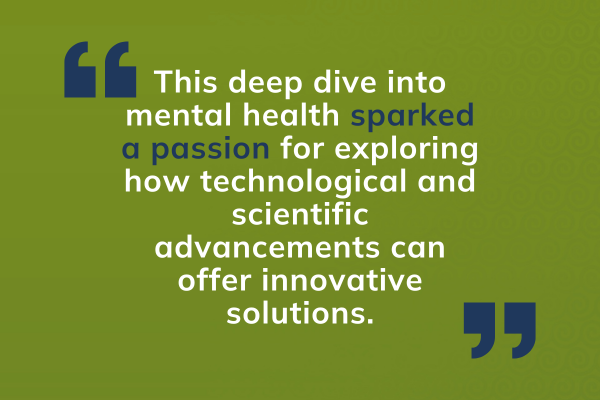Since childhood, my father's work as a biochemist sparked my curiosity about the world. I was captivated by the sophisticated equipment and vibrant mixtures in his lab, believing that science was about daily discoveries. However, he explained that science often involves repetitive failures and requires perseverance from those who believe their work benefits society. Ultimately, it was my dad who taught me that the pursuit of knowledge is a dynamic journey demanding adaptability and resilience.
During the pandemic, many of my peers grappled with mental health challenges. That is why I became determined to help solve this under-addressed issue and educate myself on the topic of mental health. I started by volunteering as a bilingual research assistant freshman year in a social science project sponsored by Boston College, where we analyzed the mental health of Satellite Babies, individuals who experienced early separation from their immigrant parents yet were later reunited in their teenage years. Our examination delved into how this lengthy parent-child separation at such a young age influenced Satellite Babies’ long-term capabilities to form meaningful connections as they matured into adolescence. I was able to publish a research manuscript on my findings, and I shared it with my school psychologist, Dr. Ezra, to facilitate greater trust and transparency between teachers/students at school.

I began to see the potential for science, technology, engineering, and mathematics (STEM) fields to address mental health issues through data analytics, artificial intelligence, and digital therapeutics. I realized that by leveraging STEM, I could contribute to creating tools and platforms that provide better support and interventions for mental health, ultimately helping to bridge the gap between scientific research and practical, real-world applications.
This summer, I attended the Tech Girls program which brought together over 100 girls from 32 countries in learning college-level STEM courses, job shadowing at major companies, and learning about cultural differences. There, I was exposed to a starkly different reality faced by many of the girls from other countries. Many girls shared stories of facing societal pressures, such as early marriages and limited educational opportunities. This experience underscored for me how much my own situation has been shaped by privilege and support, and it highlighted the critical need for broader global initiatives to create equal opportunities in STEM for girls everywhere. The diverse stories of struggle and resilience I encountered have deepened my commitment to advocating for gender equity in STEM and have inspired me to use my privilege and platform to support and amplify the voices of those who face greater barriers.
I actively support girls pursuing STEM careers through my involvement with the STEAM Girls club, where high school students mentor younger girls. I also organize and participate in community events and STEM fairs that showcase female role models and provide hands-on experiences. My work with the Youth Advisory Board in The National Girls Collaborative Project (NGCP) has further amplified my voice in advocating for gender equity. For instance, Sandra Yang’s discussion on cybersecurity inspired me with practical advice and highlighted the field's importance, motivating me to promote female representation in cybersecurity.
Overall, it is vital for youth to have a voice in STEM, as their perspectives often drive innovation and reflect societal needs. Their involvement ensures that STEM developments address a broader range of issues and are more inclusive. For example, in my role as a member of the Business Financial Awareness Club, I highlighted the ethical implications of neuromarketing, demonstrating how technology reshapes consumer behavior and marketing strategies.
To support gender equity and youth involvement in STEM, I envision expanding accessible and inclusive STEM programs, increasing scholarships, mentorships, and hands-on workshops, and fostering partnerships between schools, businesses, and STEM organizations. Promoting female role models and creating supportive networks are essential for dismantling stereotypes and inspiring the next generation of female STEM leaders. In the future, I see myself as an advocate and mentor for girls in STEM, leading outreach programs, developing educational materials, and partnering with organizations to create inclusive environments. By leveraging my experiences and platform, I aim to empower young women, providing them with the tools and confidence to excel in STEM.
To young people, my message is clear: your voice in STEM is powerful and essential. Every perspective, question, and idea contribute to advancing technology and science. Don’t underestimate the impact of your contributions. Seek out local STEM clubs, workshops, and mentorship programs. Volunteer to lead initiatives that encourage girls to explore STEM, engage in discussions about gender equity with your peers, and use social media to share stories of female role models. Your involvement can help shape a more diverse and innovative future in STEM.

Lucia X.
Lucia (Lulu) X. is a sophomore in high school who presents herself as a result-oriented student who strives to live and a collaborative team player who cares about knitting a community together. Attending an all-girls school for her middle school years and continuing on in her high school career, she has come to realize the innovative ideas that women can bring to the STEM field. She hopes that her connections with teachers, advisors, and mentors alike can help her to inspire young girls in STEM to speak out for what they believe in. In school, she is part of the Medical Science club and outside of school, she pursues a passion in artificial intelligence and mental health.
Some of her achievements include winning second place in the Girls STEAM Institute Virtual Reality Business Challenge – using VR to help deal with mental health issues, and winning first place out of 12 competing teams in Girls Inc. of NYC four-week Girl Boss Entrepreneurship Summer Program, in which she pitched a “COVID Toolkit” to the Health & Wellness Industry panel. She has also published an article on Neuromarketing Ethics and Controversies on STEAM News. Outside of STEM, Lucia does competitive swimming, learns about financial investing, and enjoys creative writing.